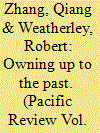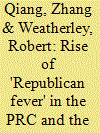|
|
|
Sort Order |
|
|
|
Items / Page
|
|
|
|
|
|
|
| Srl | Item |
| 1 |
ID:
000440


|
|
|
|
|
| Publication |
London, Macmillan, 1999.
|
| Description |
x, 185p.
|
| Standard Number |
0312222815
|
|
|
|
|
|
|
|
|
|
|
|
Copies: C:1/I:0,R:0,Q:0
Circulation
| Accession# | Call# | Current Location | Status | Policy | Location |
| 041748 | 323.0951/WEA 041748 | Main | On Shelf | General | |
|
|
|
|
| 2 |
ID:
123106


|
|
|
|
|
| Publication |
2013.
|
| Summary/Abstract |
This article examines the emergence of an increasingly vociferous public debate in China over the true contribution made by the KMT in the war against Japan. Following years of rigid adherence to the traditional Maoist line that the CCP won the war almost single-handedly, the party has finally moved towards a more realistic and honest assessment that recognises the pivotal role played by the KMT in defeating the Japanese. The rationale for conceding this point is ultimately linked to the question of nationalist legitimacy. At a time of increasing socio-economic uncertainty and in an effort to fill the ideological void left by the demise of Chinese Marxism, the party is trying hard to bolster its nationalist credentials. One way that it is doing this is by presenting a united patriotic front on the war against Japan, with itself at the helm. However, things have not materialised in the way the party had anticipated. Along with strong expressions of national pride in China's war effort, some members of the public have responded with sympathy towards the KMT veterans who fought the Japanese. With this sympathy has come antipathy towards the CCP who are accused of persecuting KMT soldiers after 1949, of re-writing the history of the war for its own propaganda purposes and of betraying the nation by, amongst other things, avoiding armed conflict with Japan and leaving the KMT to fight the war on its own. In light of this growing (although not necessarily majority) public reaction, we argue that instead of fortifying the party's nationalist legitimacy, the official reappraisal of the KMT's role in the war runs the risk of eroding that legitimacy.
|
|
|
|
|
|
|
|
|
|
|
|
|
|
|
|
| 3 |
ID:
072759


|
|
|
|
|
| Publication |
London, Routledge, 2006.
|
| Description |
201p.hbk
|
| Standard Number |
0415391091
|
|
|
|
|
|
|
|
|
|
|
|
Copies: C:1/I:0,R:0,Q:0
Circulation
| Accession# | Call# | Current Location | Status | Policy | Location |
| 051426 | 951.05/WEA 051426 | Main | On Shelf | General | |
|
|
|
|
| 4 |
ID:
129446


|
|
|
|
|
| Publication |
2013.
|
| Summary/Abstract |
This article examines the upsurge in Chinese public support for the legacy of the Republican era, a phenomenon known as 'Republican fever'. The fever has arisen following the formal relaxation of restrictions on discussing the Republican period. The rationale for doing so is linked to political expediency and in particular to the CCP's quest for nationalist legitimacy. By acknowledging the positive aspects of the Republican era as part of a placatory policy on reunification with Taiwan, the CCP is trying to present itself as a key partner in a united patriotic front with the Kuomintang. But things have not turned out as planned. As Republican fever has spread across a diverse section of Chinese society, so too has criticism of the CCP's record in power. In light of this, we argue that instead of fortifying the Party's nationalist legitimacy, the CCP has unwittingly started a process which appears to be eroding that legitimacy.
|
|
|
|
|
|
|
|
|
|
|
|
|
|
|
|
| 5 |
ID:
191934


|
|
|
|
|
| Summary/Abstract |
Comrade Lei Feng, a soldier in the People’s Liberation Army, is renowned in China as a national role model, famed for his routine altruism rather than for any acts of exceptional braveness or daring. Over the years, a number of national campaigns have been launched to emulate the behaviour of Lei Feng, with the objective of improving public morality. But the campaigns have also been an important source of political legitimacy, particularly for Mao Zedong. This is because Lei was widely propagated as an ardent Maoist who studied the ideas of Mao by night and implemented them by day, presenting a shining example of benevolent Maoism which assisted Mao’s return to the helm of Chinese politics during the Cultural Revolution. Less well-documented, and the focus of this article, is the utilisation of Lei Feng by Mao’s elite colleagues in their own personal quests for political ascent. In the internecine intra-party power struggle to succeed Mao as paramount leader, separate rival factions led by each of the Gang of Four, Deng Xiaoping and Hua Guofeng heaped praise on Lei Feng to demonstrate their own devotion to Mao. As the power struggles intensified, each of the candidates also used Lei to besmirch the political credentials of their opponents by suggesting that they were anti-Lei, by implication anti-Mao.
|
|
|
|
|
|
|
|
|
|
|
|
|
|
|
|
| 6 |
ID:
165959


|
|
|
|
|
| Summary/Abstract |
This article examines how Chinese middle-school history textbooks are written as a means of legitimising the rule of the Chinese Communist Party (CCP), by carefully utilising China's past. The authors identify (or perhaps “construct”) a sinified model of good governance in the textbooks that derives from the teachings of Confucius and Mencius, and the subsequent practises of certain revered Chinese emperors. This model is then applied to CCP leaders in the modern-era textbooks in order to cast them as diligently upholding a time-honoured Chinese tradition of legitimate rule. In a broader context, our analysis fits within the ongoing discussions about the continuing legacy of Confucianism in contemporary China and the CCP's efforts to locate itself within this as a way of fortifying its own legitimacy. We also note how some of the themes of good governance contained in the textbooks are closely linked to contemporary government policies and priorities, such as anti-corruption schemes and constitutionalism. The objective in so doing is to propagate the importance of these themes to a young audience.
|
|
|
|
|
|
|
|
|
|
|
|
|
|
|
|
|
|
|
|
|